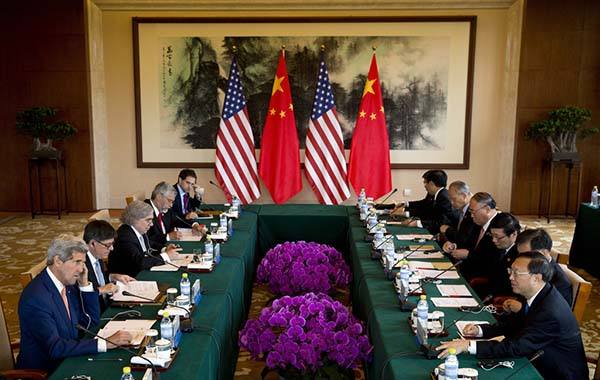Finance and Economics
财经
Trade Deals: Trying For Anything
贸易协议:尝试一切可能
The biggest trade deal in decades shows why getting an agreement is so hard.
数十年来内最大贸易协定表明了为什么达成协议如此困难。
IN THE wee hours of December 7th 2013, after weeks of haggling, exhausted trade representatives stood to applaud.
2013年12月7日凌晨,在持续几周的讨价还价之后,筋疲力尽的贸易代表们全体起立,鼓掌庆祝。
Agreement had been reached on the first trade deal in the history of the World Trade Organisation (WTO).
在世界贸易组织(WTO)历史上的第一项贸易协定已达成一致。

No longer could it be accused of being a talking shop, crimped by consensus.
这项协议再也不会受制于各执己见无法统一而被视为空谈。
“For the first time in our history, the WTO has truly delivered,” said Roberto Azevedo, the body's chief.
机构主席罗伯特·阿泽维多说:“世贸组织真正诞生了,这是我们有史以来的第一次”。
The deal is tantalisingly close to coming into force, needing just two more national ratifications.
但是协议差一点点便可以生效,仅仅再需要两个国家的批准。
Chad, Jordan, Kuwait and Rwanda are competing to take it over the line.
而乍得、约旦、科威特与卢旺达正在激烈争夺。
In theory, the Trade Facilitation Agreement (TFA) is a beacon of hope on the trade landscape.
理论上说,贸易便利化协议就像贸易世界的灯塔。
It was unanimously agreed to by rich and poor countries.
这项协议得到了富裕国家和落后国家的一致同意。
If fully implemented, it could have an even bigger impact than slashing all tariffs.
如果协议得到完全实施,那么它带来的影响甚至比大幅度削减所有关税的影响还要大。
It is an example of a win-win deal, in which peer pressure pokes governments into making life easier and more prosperous.
这是双赢协定的典型,在所有成员的压力下,各国政府着手使生活更加便利、更加殷实。
The agreement shies away from slashing subsidies or toppling tariffs, and instead hacks at the thicket of regulatory trade barriers.
这项协定没有去大幅削减补助,或者降低关税,反而大肆修改监管贸易壁垒的尺度。
The red tape is stickiest in poorer countries; in sub-Saharan Africa exporters must endure nearly 200 hours of inspections, regulations and paperwork.
贫困国家的过关手续是最繁琐的;在非洲撒哈拉沙漠以南地区,出口商需要忍受近乎200个小时的检查、监管以及通关文书等手续。
Richer countries face only 15.
不过,发达国家只需要15个小时。
The TFA is supposed to surmount these hurdles by, for example, setting standards, streamlining processes and squeezing fees.
贸易便利化协定将克服这些阻碍,比如说,通过设定新的标准,流水线般的通关手续同时降低费用。
This would cut trade costs by as much as 15% in poorer countries.
该协议将帮助贫困国家削减多达15%的贸易花销。
It also enforces greater transparency.
同时也会有助于提高透明度。
Export-led growth is tricky if people do not know how to export.
如果商人不知道如何进行出口,那么以出口导向为增长(的贸易)会很困难。
A study by Evdokia Mose and Silvia Sorescu of the OECD found that better information could cut trade costs by 1.7% in low-income countries.
来自经济合作与发展组织(OECD)的Evdokia Mose和Silvia Sorescu发现,在低收入国家,更为有效的信息途经会减少1.7%的贸易花销。
考研英语时事阅读












